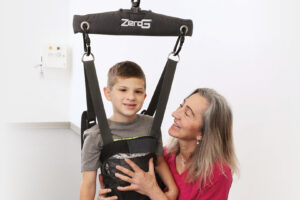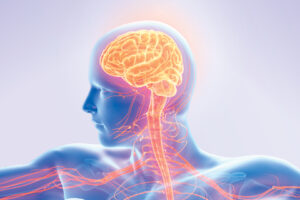Heads up! You’re sitting at your daughter’s soccer game when a ball gets kicked toward the sidelines. It strikes you in the side of the head. You’re caught off guard, but you shrug it off and send the ball back into play. Later in the day you develop a headache. Could you have a concussion?
A concussion is a mild brain injury due to a fall, motor vehicle accident, sports injury or some other type of trauma. While you’ll most likely recover fully, in the short term, a head injury will affect the processing power of your brain, including your balance, vision, speech, hearing and more. Even just a quick neck jerk can affect your brain’s processor, which can be like having a rowboat instead of a motor boat; it will still function, but it will take much longer to get where you need to go.
Five Symptoms of a Concussion
- Headache. A headache is one of the first symptoms of a concussion, and it’s important to recognize that signal and not just push through the pain.
- Sensory overload. You may feel overwhelmed by sights and sounds, since your brain can’t process information as quickly as it could before. This slow processing can be further mired by the use of backlit screens, like cell phones, tablets, computers and TVs. Your brain has to process the information on the screen – and the light, too. After a concussion, you may be able to read a print book for 20 minutes or so before your brain becomes overloaded and you develop a headache. If you’re reading on a tablet or an e-reader like a Kindle, you will probably only be able to read for about five minutes.
- Inability to multitask. You may have trouble doing a visual task and a motor skill at the same time, such as reading street signs while operating a car. Obviously, this deficit can have dangerous consequences, so it’s important to recognize the signs and let someone else drive until you feel better.
- Difficulty holding a conversation. After mild head trauma, you may find yourself struggling to find the right words in conversations or losing your train of thought.
- Changes in sleep patterns. Are you sleeping more than usual or finding it difficult to sleep? Sleep is an important tool for brain health—it is reparative and enables your brain to process connections and store memories. This process may be interrupted when you are concussed.
Diagnosing a concussion requires a physical examination. Imaging studies may be ordered, but in most cases, CT or MRI scans for a concussed person will look normal. An exam is the best way to assess a patient because it evaluates the patient as a whole.
Coping with Concussion: Men and Women Aren’t Equal
Recovery time varies between men and women, and children and adults. Women experience concussions more easily and it takes longer for them to recover. When it comes to getting concussed, it’s believed that due to their muscle mass, men can ward off blows to the head easier than women. After a concussion, the body’s response is to produce anti-inflammatory markers. In women, the peak of production may be delayed up to a week, while men produce an anti-inflammatory response within 24 hours. Other conditions, such as learning disabilities, depression, anxiety and mania, can delay recovery and affect the brain’s ability to repair itself.
If you experience a concussion:
- Take two to three days of “brain rest”
- If possible, stay home from work or school for a few days
- Perform low-level physical activity, like walking
- Avoid backlit screens
- If you develop a headache or blurry vision, stop what you’re doing, close your eyes for a few minutes and then return to the activity
- Wear sunglasses or a hat with a broad brim while outside or when using a computer to decrease light input into brain
- Create a dimmer, quieter work or school environment, especially for testing or thought-provoking work
- Avoid driving until symptoms improve, and use sunglasses or close your eyes while riding as a passenger
- Take care with financial calculations, like balancing your checkbook or counting your change after a purchase
Unfortunately, there’s no magic pill to recover from a concussion. For women in particular, juggling career, childcare and household responsibilities while concussed will require assistance. Symptoms should resolve in six months or less. If you experience symptoms longer than six months, see your doctor to rule out traumatic brain injury.





